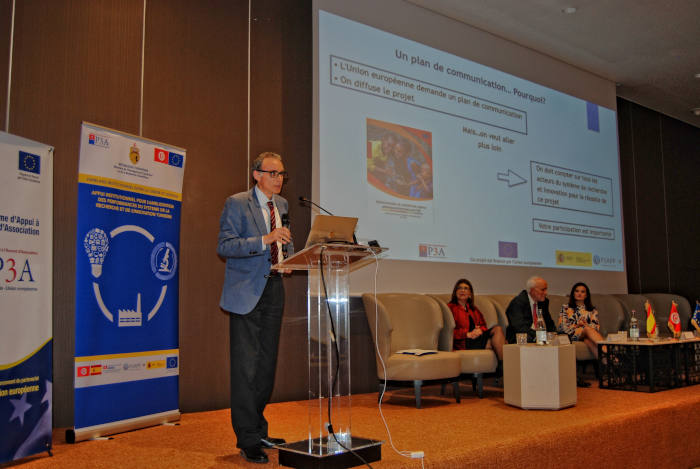-
16 August 2019
Category : Interview
FIIAPP Expatriates: Severino Falcón
"Talks with other experts and learning about the point of view of the other side of the Mediterranean is a very enriching experience"
 "Talks with other experts and learning about the point of view of the other side of the Mediterranean is a very enriching experience"
"Talks with other experts and learning about the point of view of the other side of the Mediterranean is a very enriching experience"Severino Falcón, coordinator of the “Improvement of the Tunisian research and innovation system” project and chief technical adviser of the Ministry of Science, Innovation and Universities tells us about his experience during his initial months in Tunisia: his first mission and his first experience living abroad.
How long have you been in Tunisia?
Six months.
How have you adapted to this country?
To answer this question, I must stress that it is my first mission. So, in the beginning, I went carefully, but as the days have gone by, adapting has been easy, smooth and comfortable. A critical point was having an apartment to live in. Once you have accommodation, if you are happy living there, it makes it easier to adapt. In the case of Tunisia, having a small Spanish community to rely on was very helpful.
What has been the most difficult aspect to adapt to, and the easiest?
First of all, my family. But with new technologies and transport, the distance is not such an issue.
Another difficult issue is speaking Tunisian and … running. Outside the capital, there are plenty of nice places to run. But the city of Tunis is not very attractive for running.
The people here are the easiest aspect. They are very friendly.
Is this your first experience outside of Spain?
Yes. It is my first experience.
What is your work like, your daily routine? Is it very different from the routine you had in Spain?
We are doing a project with defined activities. This makes it easier to know what to do. It’s new to me, and during the last six months, my daily routine has been focused on helping to get the project up and running. For this, the experience and advice of Raphael, project manager, and each supervisor, team member and an expert who participated, have been very important.
In the past I was on the other side of the project, that is to say, convening and tracking projects of the Ministry of Science, Innovation and Universities and the State Agency for Investigation.
What is your relationship like with the FIIAPP team in Madrid?
Basically, my relationship with the FIIAPP is through Yessica, the technician who manages the project, who I talk to and send emails to every day. I work with her to find ways to include the activities proposed into the project’s framework. It isn’t easy, since ideas often come up that are not feasible (such as changing the direction of a mission). Nancy joined us recently, and she is helping with mission logistics and travel for the experts. In short, the relationship, at least on my part, is very good… Now you will have to ask Yessica and Nancy.
And with your colleagues in Tunisia?
I have a great relationship with the work team.
I speak to my counterpart every day and we get on well. With the project leader of the Ministère de l’Enseignement supérieur et de la Recherche Scientifique (MESRS) too, though, although she is close by, since she has been appointed director general of research we have to organise meetings well in advance.
How would you assess your experience of working as a FIIAPP expatriate?
In view of my previous answers, I only have one answer to that question. Very good.
Do you have any experiences or anecdotes about your arrival in or adaptation to the country?
Every week and even every day is different. From the time you spend alone to the times when you can’t keep up with your work and social engagements.
For the time being, having conversations with other experts and learning about the point of view of the other side of the Mediterranean is a very enriching experience.
The views and opinions expressed in this blog are the sole responsibility of the person who write them.




